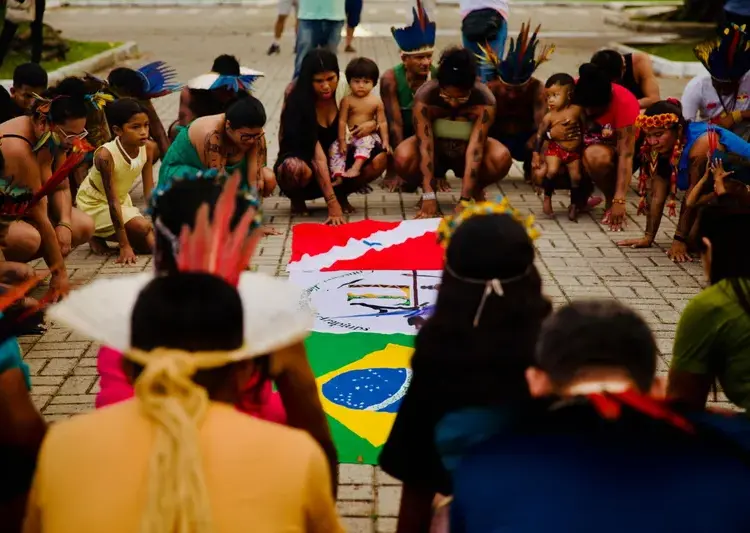On Wednesday morning (22), in the wake of ongoing education protests, representatives of the Pará government met with Indigenous leaders to propose an agreement on school teaching changes in communities. However, protesters occupying the Pará State Education Secretariat (SEDUC) building claim their voices remain unheard, choosing to continue their occupation.
“This group [that took part in the meeting with the government] doesn't represent all the Indigenous peoples here. There was no attempt to contact us,” says teacher Lidia Borari, who is participating in the occupation. “They are trying to delegitimize our movement by talking only to this commission,” she says.
According to a note sent by SEDUC to Brasil de Fato, a commission has been formed to discuss and build the State Policy for Indigenous School Education.
The Tapajós and Arapiuns Indigenous Council (CITA) stated that the text used in the meeting with the government was drafted by the protesters. “The proposal was for us, the Indigenous peoples who are occupying SEDUC, to draw up the text with the guidelines for Indigenous School Education, through a commission of relatives who met with Secretary Rossieli Soares,” says.
According to CITA, this stage has been completed, and the text has been usurped, “skipping stages that we consider essential, that is, without our due participation,” the report says.
In Borari's opinion, the meeting between Fepipa and the government was an attempt to weaken the demonstrations. “They're having isolated conversations. This kind of representation doesn't work, we're not coordinating with the state government,” she said.
The demonstrators are calling for repealing state law, which puts at risk the Modular Education Organization System, a public policy for including students in high school and the final years of elementary school in communities without regular education.
A new law approved last December 19, at the end of the legislative year, the new law repealed the entire regulatory framework for Indigenous school education in the state, as well as putting an end to the face-to-face system in Pará's Indigenous communities, making all classes virtual.
According to the note sent by SEDUC, the Modular Education Organization System will be maintained. On the other hand, the Indigenous people claim that the government has been gradually implementing changes that affect the quality of education in the state.
Indigenous movement demands co-chairmanship of COP30
After the federal government announced diplomat André Corrêa do Lago as the president of COP30 on Tuesday (21), the Indigenous movement publicly expressed its regret that their demand for a representative to co-chair the UN Climate Convention, scheduled for November in Belém, Pará state, has not yet been met.
The Articulation of Indigenous Peoples of Brazil (APIB) welcomed the appointment and the “extensive experience in negotiations and the climate agenda” of Corrêa do Lago, the current Secretary of Climate, Energy, and Environment. “We trust that he will be able to lead the discussions towards more ambitious climate goals,” the Indigenous organization said in a statement.
“Despite this,” APIB continues, “we deeply regret that the Brazilian government has not yet responded to our demand for an Indigenous co-presidency.” According to the organization, the position is demanded because of the “central importance of Indigenous peoples in protecting biomes, biodiversity, and consequently, the climate balance.”
The COP presidency is responsible for mediating negotiations and proposing consensus among countries that sign the United Nations Framework Convention on Climate Change (UNFCCC). It is also responsible for facilitating the drafting of the event's final declaration.
The demand for an Indigenous co-presidency at COP30 has also been reinforced in the week that Donald Trump takes over the US presidency, announcing steps backward about global agreements to reduce greenhouse gas emissions.
Brasil de Fato reached out to the Presidency of the Republic and the Ministry of the Environment and Climate Change regarding the Indigenous movement's demand but had not received a response by the time this article was finished. If they do respond, the article will be updated.




